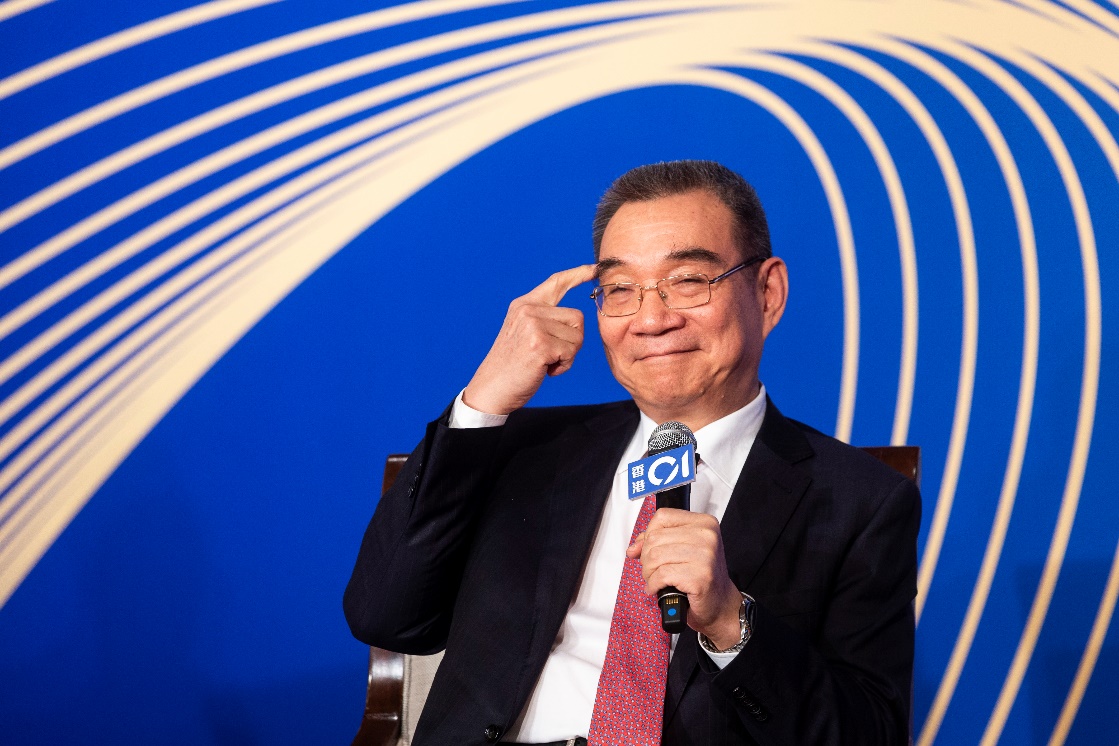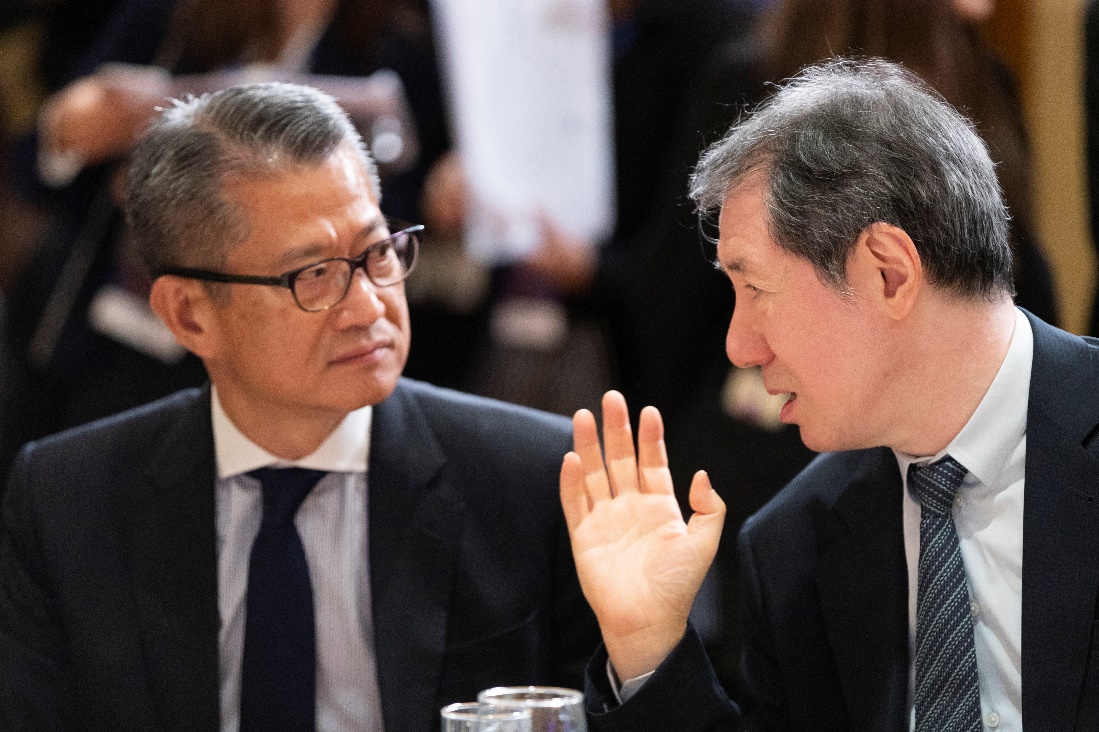Trends and Opportunities: HK01 2019 Economic Summit Hosted in Hong Kong
發布時間 :2019-12-16
On December 2nd, 2019, Nan Hai Corporation's subsidiary advocacy media HK01 hosted the"HK01 2019 Economic Summit" at Hong Kong's Conrad Hotel. Attended by renowned economists and distinguished individuals from the political and business sectors, the conference, titled "Grasping Trends, Making Opportunities", examined China at its 70th anniversary from a macro perspective, and explored over the opportunities that Hong Kong has through utilizing its geo-economic advantages and promoting innovative business transformations, such that the city may be better future-prepared.

Included in the conference's attendance list are YU Pun-hoi (founder and Chief Executive of HK01 and Board Chairman of Beijing University's Institute of New Structural Economics, aka INSE), Carrie LAM CHENG Yuet-ngor (Chief Executive of Hong Kong), CHANG Zhenming (Chairman of CITIC Group), Justin LIN Yifu (Director of INSE and former Chief Economist of World Bank), Paul CHAN Mo-po (Financial Secretary of Hong Kong), Laurence Li Lu-jen (Chairman of the Hong Kong Financial Services Development Council), Ba Shusong (Managing Director of the Hong Kong Stock Exchange, aka HKEX), and Peter LAM Kin-ngok (Chairman of the Hong Kong Trade Development Council).
Participants of the conference explored in depth Hong Kong's socio-economic predicaments and opportunities, discussed possible reforms and Hong Kong-Mainland exchanges, and shared observations over China's current and future economic performances.

In his speech, YU Pun-hoi imputed Hong Kong's challenges to its inability in keeping income on par with GDP growth and asset appreciation. In light of Hong Kong's recent turbulence, Yu advocated for comprehensive economic reforms, and with the Mainland's economic transformations as an example, emphasized the vital need of constant reforms in accordance with the ever changing society.
Yu stress that the reason Shenzhen's economy was able to surpass Hong Kong is rooted in the government's persistent industrial policies, whereby the government actively incentivizes the private sector, allowing companies like Huawei and BYD to flourish, while at the same time issues out restrictive policies to control housing prices, such that Shenzhen was able to avoid much of Hong Kong's complex housing problems despite experiencing higher real estate inflations, reflecting the shortcomings of the liberal market.

Carrie LAM stated that since she took on the role of the Chief Executive in 2017, Hong Kong's government had exercised facilitative and promotional roles in the economy, such as pushing for Hong Kong Stock Exchange listing rule amendments, attracting IPOs of new economy firms, including that of Alibaba. As of the end of November 2019, there had been 15 firms newly listed according to the amended rules. She also states that the Hong Kong stock market successfully raised over 230 billion Hong Kong dollars during the first 11 month of 2019, potentially ranking it again as the highest fundraising market. The government had also simultaneously facilitated businesses through tax reforms such as Two-tiered Profits Tax Rates arrangements and tax rebates for research and development costs.
The Chief Executive recognizes the impacts of the recent social events, but believes that the movement will pass eventually, and hopes that different parties may join together in united efforts to overcome current challenges, and get off to a fresh start.
 With the trade quarrels between US and China and the world's slowing economic growth in mind, the market is especially keen in following China's economic performance. The director of Beijing University's Institute of New Structural Economics and former Chief Economist of World Bank, Justin LIN Yifu predicts during his keynote address that China's GDP growth can be sustained above the 6% mark all the way until year 2030, and that China will continue to be the country with the most opportunities as well as the major contributor to world economic growth during a downward period.
With the trade quarrels between US and China and the world's slowing economic growth in mind, the market is especially keen in following China's economic performance. The director of Beijing University's Institute of New Structural Economics and former Chief Economist of World Bank, Justin LIN Yifu predicts during his keynote address that China's GDP growth can be sustained above the 6% mark all the way until year 2030, and that China will continue to be the country with the most opportunities as well as the major contributor to world economic growth during a downward period.

During his speech, CHANG Zhenming stated that Hong Kong had always been familiar to CITIC, the conglomerate had invested heavily in the city ever since 1980. He recalls the acquisition of Ka Wah Bank by CITIC in 1986, and he himself serving as the bank's Chief Executive in 2001, being the first mainlander to take on such roles across the sector. Back then, mainland banks were struck with impression of "having a lot of bad debt, high cost-revenue ratio, and lacking international competitiveness", Hong Kong provided valuable experiences in terms of operating in a capital market. However, many of the mainland banks now stand as world-class institutions, yet the impression towards them by many Hong Kong people remained rather stagnant, with unnecessary doubts regarding credit management and operating capacity in the mainland.

During his luncheon speech, Financial Secretary Paul Chan commented on the rapid integration progress of the Guangdong-Hong Kong-Macau Greater Bay Area, and stated that Hong Kong's irreplaceable role to the Greater Bay Area lies at the Special Administrative Region's political-economic system, and that Hong Kong may contribute to the Greater Bay Area greatly as an innovative center.
In response to recent voices, Hong Kong government included, that encourages young Hong Kongers to pursue opportunities in the Greater Bay Area, YU Pun-hoi states that such understanding is flawed in not recognizing Hong Kong already being part of the Greater Bay Area. Yu stresses that the Hong Kong society should not view the Greater Bay Area as a simple trade concept, but rather a mutual-developmental concept. Much like Germany and France may closely integrate on the urban development and economic level in spite of systematic legal and political differences, Yu firmly believes that under One Country Two Systems and with Hong Kong retaining a high degree of autonomy, Hong Kong and Shenzhen may push for urban integration in terms of transportation and authentication etc., so as to promote the Smart City blueprint.
During the discussion stage, guests exchanged ideas on how the government, business sector and the academia may come together to facilitate Hong Kong's innovative culture, assist businesses in grasping and implementing innovative mindsets and technologies, rejuvenate traditional industries and business models, and ultimately enhance Hong Kong's competitive edge.

